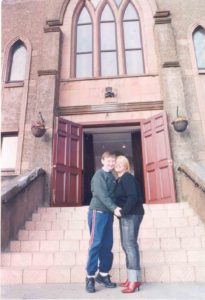Our founder: his spiritual journey
 Henri Bissonnier was a French priest who , while training for the priesthood contracted tuberculosis. He was sent to a sanatorium up in the mountains where he became aware of the need for pastoral care for the patients.
Henri Bissonnier was a French priest who , while training for the priesthood contracted tuberculosis. He was sent to a sanatorium up in the mountains where he became aware of the need for pastoral care for the patients.
He vowed that, if he was ever ordained, he would ask his bishop to appoint him as a chaplain to a hospital.
He was ordained and after a time in a hospital he was appointed as chaplain to a huge institution for people with learning disabilities. Here he began his pastoral work and discovered that he did not know HOW to pass on the faith to people who were not interested in knowing facts about Jesus or the church. He tried to find another way.
Gathering Together
 He began to realise that the place where the people gathered was important. It had to communicate a sense of the sacred – a holy place. This cold impersonal classroom was no good.
He began to realise that the place where the people gathered was important. It had to communicate a sense of the sacred – a holy place. This cold impersonal classroom was no good.
 And so he began to gather people round the Holy Book, with a candle and flowers. The place was sacred. Jesus was truly present.
And so he began to gather people round the Holy Book, with a candle and flowers. The place was sacred. Jesus was truly present.
 The Word of God
The Word of God
Instead of a lesson about the Book of God’s Word, what was important was a sense of the sacredness of this book.
The way the leader lifted it; held it: read the words with gesture and eye contact.
Creation
He began by using things that were familiar, that is, things within the life experience of the people.
 A flower: you could hold it, smell it, see it in the garden; have a favourite one.
A flower: you could hold it, smell it, see it in the garden; have a favourite one.
The flower was part of God’s creation. What other things in God’s creation did we enjoy?
And so he began what we now know as a process of EVOCATION – drawing out of people’s life experience.
This worked better than trying to impart INFORMATION.
By using these very familiar things to evoke life experiences, Mesny found he was getting responses.
Fr Paulhaus
Then along came Fr Paulhaus from Canada. He was an educational psychologist and came to do study with Mesny.
He wrote this very important book called THE RELIGIOUS EDUCABILITY FOR THE MENTALLY RETARDED ( we wouldn’t use that language today) – important because it was the first time in the history of the Church that it has been said that people with learning disabilities were educable in faith. Before we did not know HOW to share faith but now we were finding a method.
Development of a method of catechesis
Instead of stressing the importance of knowing a lot of facts, Paulhaus saw that these 4 points were much more essential.
 Awakening a sense of the sacred meant creating a very special kind of environment.
Awakening a sense of the sacred meant creating a very special kind of environment.
An ecclesial sense – we are all baptised members of the church. Together we form the Body of Christ. We all need to experience belonging to that church and contributing to its life.
 A sense of Christ – we are made in God’s image. We deserve respect and recognition.
A sense of Christ – we are made in God’s image. We deserve respect and recognition.
 Faith – not a set of beliefs but an awareness of a relationship.
Faith – not a set of beliefs but an awareness of a relationship.


